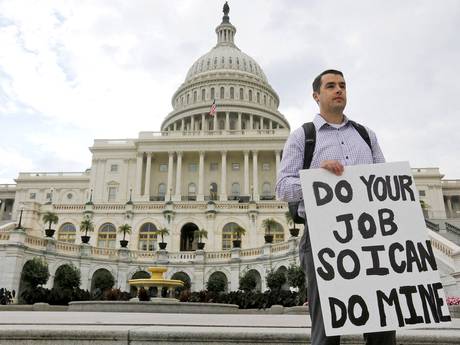Rupert Cornwell
The Independent
October 2, 2013
 And so – absurdly, shamefully and almost incomprehensibly – it has come to this. The legislature of the richest, most powerful country on earth, that likes to present itself as a model of democracy and good sense, has failed in its basic task of providing funds to keep the federal government running.
And so – absurdly, shamefully and almost incomprehensibly – it has come to this. The legislature of the richest, most powerful country on earth, that likes to present itself as a model of democracy and good sense, has failed in its basic task of providing funds to keep the federal government running.
Of course, not everything will shut. The US military will not be affected, and those, like air traffic controllers and prison guards who perform vital services, will remain on the job. In many parts of the country, the impact will be little felt, at least to begin with. But for 800,000 federal workers deemed less essential, days or weeks of unpaid lay-offs beckon. How on earth did it come to this?
President Obama was left to rail against the “ideological crusade” against Obamacare, vowing not to “give in to the reckless demands by some in the Republican Party to deny affordable health insurance to millions of hard-working Americans”.
In some respects, what is happening in Washington DC is not unusual. America has a presidential system, not a parliamentary one like Britain. Here, the annual federal budget the White House sends Congress is merely an opening gambit. On Capitol Hill, the process restarts from scratch. If control of Congress is divided, as now, no budget may be passed at all.
Indeed the last time a budget was enacted fully and on schedule, with separate appropriation bills for government departments, was in 1997. But recently the deadlock has worsened. An overall spending bill has not been approved for three years. Stopgap “continuing resolutions” (CR), which keep government open while the Republican-controlled House and the majority-Democrat Senate bicker, have been the norm. At midnight on Monday the latest CR ran out. Congress could not agree on a new one.
Nor is a shutdown without precedent. The last – and at 21 days the longest – occurred in 1995-96, during Bill Clinton’s first term. Indeed it was during that enforced idleness that the President began his fateful dalliance with Monica Lewinsky. But when it was over, no serious economic damage was done. This time, however, things look different.
Back then, the economy was strong. Today, recovery from the 2008 financial crisis is still fragile. At the very least, the closure and the accompanying lay-offs will reduce consumer confidence and spending. And in a deeper sense, the impasse reflects an ever more polarised and dysfunctional political system, where compromise is a dirty word.
 Daily Stormer The Most Censored Publication in History
Daily Stormer The Most Censored Publication in History


